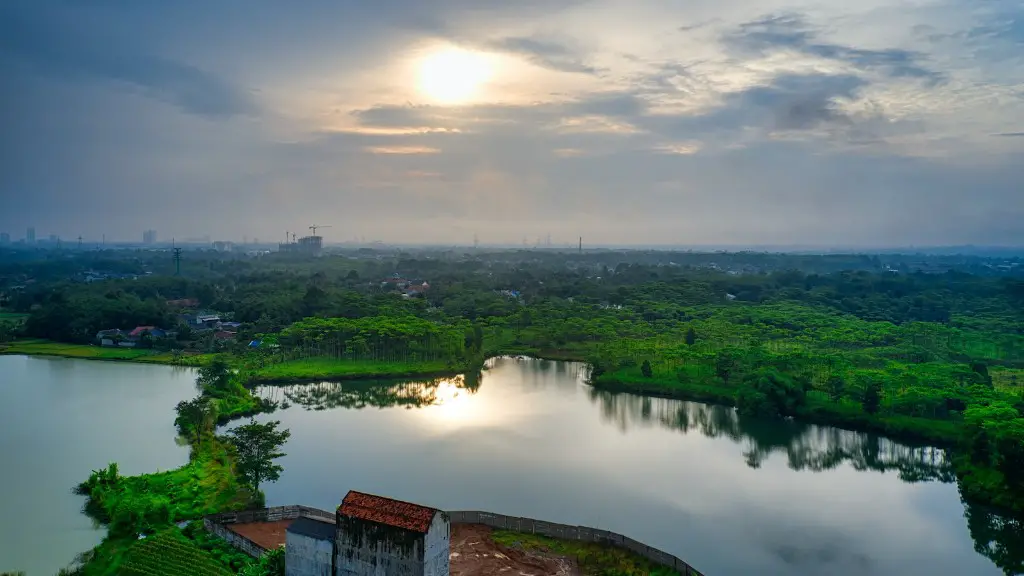The Nile River was integral to the development of religion in Ancient Egypt. The Nile was a source of life and abundant resources, providing the religion as well as the people of Egypt with fresh water and sustenance. Ancient Egyptians believed that the Nile provided the gods with their sustenance, as well as the power to carry out their will. They also believed that the Nile was the source of divine inspiration that was given to their rulers.
From a practical standpoint, the Nile also influenced the development of religious festivals and rituals. Many of these festivals revolved around the yearly floods and the subsequent ebb and flow of the river. These celebrations, such as the Opet festival and the Hapi festival, helped Egyptians re-establish the bonds between humanity and nature, as well as humanity and the gods. With its annual flooding, the Nile also nourished thousands of miles of land around it, providing the perfect environment for agriculture and for people to live in. Ancient Egyptians organized their society around these yearly floods and relied on them for sustenance, inadvertently making the Nile River a source of religious veneration.
In addition, the Nile was seen as a symbol of creation, because the floods were seen as the bringers of new life. This view was complemented by the belief that the gods both lived in the river and traveled to and from the Duat, or the underworld. This gave the river a dualistic purpose, being both the bringer of life, but also the vehicle of the gods in their journey to and from creation. This dualism was seen in many of the Egyptian gods as well, such as Osiris and his journey to the underworld, and in the myths around the Flood.
The Nile was also seen as a symbol of the divine right of kings, with kings often presented as the sons of the gods who lived in the river. This link between the divine and the earthly was seen in the coronation rituals of the Pharaohs, who were often presented as walking on the waters of the Nile in their ascension to the throne. The Nile was also closely associated with the Egyptian concept of truth, as truth often came from the gods and was seen as emanating from the Nile.
The importance of the Nile River to the Ancient Egyptians is evident in their language itself. The word Kemet (which is often used interchangeably with Egypt) means “black land”, referring to the rich, dark soil that was brought in by yearly flooding of the Nile. The word ‘pharaoh’, which is used as the title for the absolute ruler of Ancient Egypt, is also closely linked to the Nile, meaning “great house” or “palace of the sun-god”. Furthermore, many of the gods of Ancient Egypt were closely associated with the river, including Hapi, the god of fertility, and Osiris, the god of rebirth and afterlife.
In What Ways did the Nile Shape Ancient Egyptian Religion?
The Nile was integral to the Ancient Egyptian way of life, and this was reflected in their religion as well. The Nile was seen as an omnipresent deity, one that provided sustenance, security, and even inspiration. The yearly flood of the Nile was seen as a sign of the gods’ favor, and was an integral part of the Egyptian festivals and rituals. The Nile was also closely linked to the divine right of kings, as well as the concept of truth in Ancient Egypt. Furthermore, the gods of Ancient Egypt were closely associated with the river, and the river even shaped the language of Ancient Egypt.
How Did the Nile Serve as a Foundation for Ancient Egyptian Mythology and Culture?
The Nile was integral to Ancient Egyptian mythology and culture. It was thought to be the source of divine power and the bringer of life, and its yearly floods were of great significance to their culture. It was also linked to the concept of truth and the power of the Pharaohs. As a result, the Nile god Hapi was celebrated in festivals and rituals, and the river itself was seen as an omnipresent and powerful deity. This veneration of the Nile was integral to the development of Ancient Egyptian religion and mythology.
What Role did the Nile Play in the Ancient Egyptian Landscape?
The Nile was a major force in shaping the Ancient Egyptian landscape. It provided sustenance and life to thousands of miles of land, and its yearly floods kept the earth fruitful. Its importance to Ancient Egypt and its people was apparent in its symbolism, as gods, kings and even language were linked to the river. This veneration of the Nile was a reflection of its importance to Ancient Egyptian religion.
How did the Nile Shape Ancient Egyptian Political and Social Systems?
The Nile was also integral to the development of Ancient Egyptian politics and social systems. The yearly floods provided an abundance of resources and replenished the soil, and the Egyptian people relied on these floods for sustenance and stability. This reliance on the river shaped their political and social systems, and their veneration of the Nile was a reflection of its importance not just to their religion, but to their entire society.
What Impact do the Rivers of Ancient Egypt Still Have on us Today?
The Nile River and its importance to Ancient Egyptian religion still impacts us today. Its role in their religion, mythology and culture is still visible in the archeological record, and its importance is still physical, as the Nile is the longest river in the world. The importance of the Nile to Ancient Egyptian society shows that rivers still have a profound impact on humanity, and the Nile is a great example of this.
What can be Learned from Ancient Egyptian Veneration of the Nile?
The Ancient Egyptians’ veneration of the Nile can still teach us something today. It shows us the immense importance of rivers to our societies and how integral they can be to our religions, cultures and ways of life. It also highlights how dependent we are on rivers for our own sustenance and well-being, and reinforces the need to protect them for future generations.


